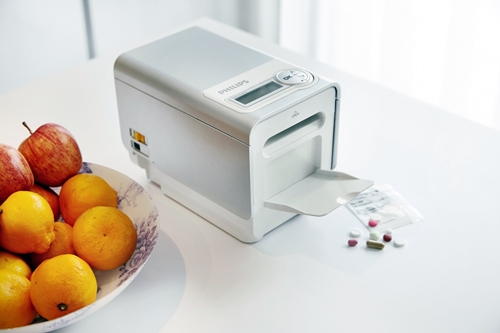1 June 2016. A device that dispenses pills in prescribed dosages at specified times was shown in a user survey to improve adherence to medications for chronic conditions to almost 100 percent. The study by technology company Royal Phillips covered individuals in the Netherlands using the company’s Medido device for up to 1 year. The device is not yet approved for use in the U.S.
Medication adherence is a continuing problem, particularly for older individuals with chronic diseases, who must take multiple medications at different times during the day. A study published in 2011 found about half of chronic disease patients do not take their medications as prescribed, which the authors attribute to a combination of factors ranging from lack of health literacy by patients to ineffective communication by clinicians, and care given by multiple health care providers.
“Proper medication adherence is such a crucial part to managing a chronic illness,” says general manager of Phillips’s home monitoring division Kimberly O’Loughlin in a company statement, “and yet the more complicated a patient’s care plan, the harder it can be to keep track of pills, doses, and the times they need to take their medication.”
The Phillips Medido dispenses pills at home for people with chronic health conditions in dosages and at times prescribed by their physicians. Medido reminds the individuals when scheduled dispensing times arrive, dispenses pills in plastic pouches opened for the patient, and monitors the individual taking the medications. The device is connected to networks, allowing clinicians or caregivers to be notified in case the individual does not take the medications.
The survey asked 1,379 individuals in the Netherlands using Medido to describe their use of the system. Average age of the respondents was 78, and 6 in 10 (61%) were female. Participants in the survey took medications on average 3 times a day, and used the device for 6.7 months.
The results show more than 9 in 10 participants on average (93%), were able to stick to their prescribed medication regimens. In addition, 96 percent of respondents indicate they took their medications 80 percent of the time or more. According to the company, this 80 percent level is the World Health Organization standard for medication adherence.
The findings also show more than 9 in 10 participants in the survey taking 2 or more doses of medications in 1 day (94%) stayed with their medications. The results show as well that adherence rates remained relatively stable over the 1 year period, with few differences found between the first month and subsequent months in which respondents took part.
The Phillips report cites a 2010 study by the company that tracked use of an earlier Medido device among 60 individuals with home care assistance. That study estimates the device can help realize savings to patients of up to 40 percent from shorter home care visits to check on medication use, or even removing the need for home care assistance.
Read more:
- Drug Pricing Reform Even Big Pharma Might Like
- Sanofi Adopting Big Data for Diabetes Drug Adherence
- Pharmacy Interventions Shown to Boost Meds Adherence
- Propeller, Boehringer Partner on Inhaler Adherence Study
- Genetic Test Found to Save Drug Expense, Boost Adherence
* * *


 RSS - Posts
RSS - Posts
[…] Another Chance to Get Serious on Drug Pricing […]